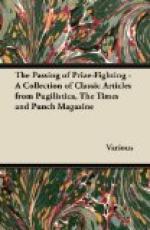The school career of the future pastor was not, therefore, a very happy one, for at school there are no feeble women to be captivated by heartrending revelations of a noble nature at war with universal wickedness, and all but shattered by the assaults of an unfeeling world. Nor, strange to say, do schoolmasters, as a rule, value the boy who ranges himself on their side in the eternal war between boys and masters. However, he proceeded in due time to a University. There he let it be known that his ultimate destination was the Church, but he had his own method of qualifying for his profession. He was not afflicted with the possession of great muscular strength, or of a very robust health. Neither the river nor the football-field attracted him. Cricket was a bore, athletic sports were a burden; the rough manners of the ordinary Undergraduates made him shudder. However, since at College there are sets of all sorts and sizes, he soon managed to fashion for himself a little world of effete and mincing idlers, who adored themselves even more than they worshipped one another. They drank deep from the well of modern French literature, and chattered interminably of RICHEPIN, GUY DE MAUPASSANT, PAUL BOURGET, and the rest. They themselves were their own favourite native writers; but their morbid sonnets, their love-lorn elegies, their versified mixtures of passion and a quasi-religious mysticism, were too sacred for print, though they were sometimes adapted to thin and fluttering airs, and sung to sympathisers in private. Most of these gentlemen were “ploughed” in their examination, but the hero of this sketch secured his degree without honours, and departed to read for the Church.
Soon afterwards he was ordained, was plunged ruthlessly into an East-End parish, and disappeared for a time from view. He emerged, after an interval of several years. The occasion was the inaugural meeting of a Guild for the Conversion of Music-hall Artistes, which is to this day spoken of amongst the irreverent as the Song and Sermon Society. The sensation of the meeting was caused by the fervent speech of a clergyman, who announced that he himself had been for some months a professional Variety Singer, attached to more than one Music-hall, and that, having studied the life de pres, he knew all its temptations,




